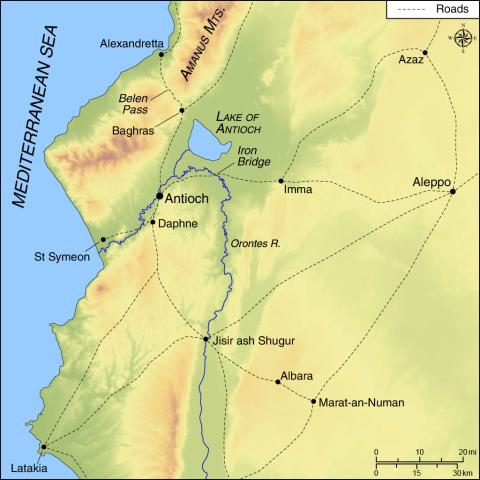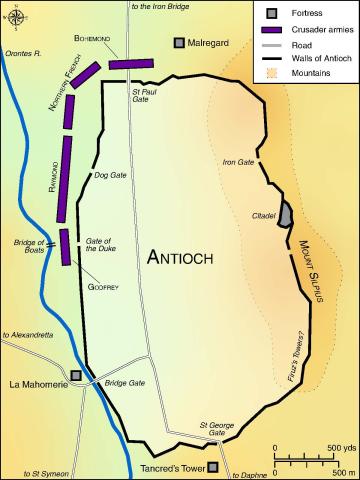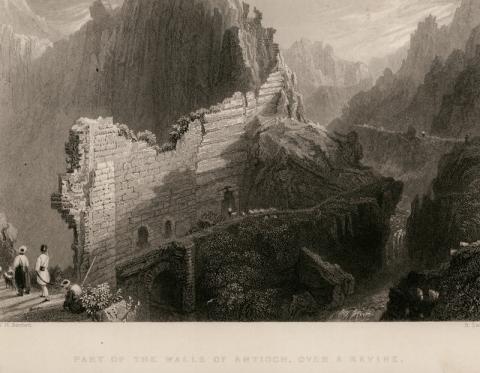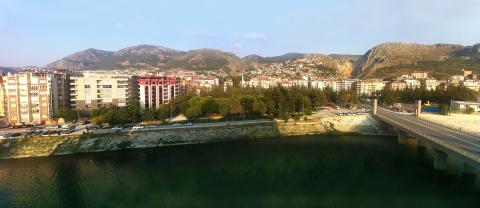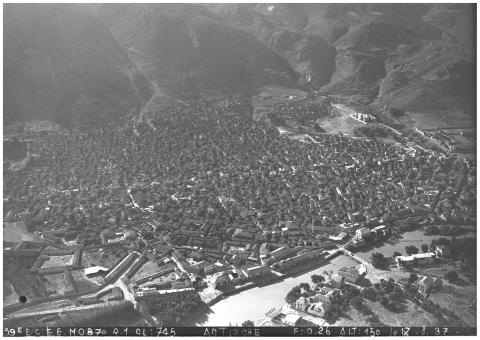The Crusaders Besiege Antioch
[5.12.1] Cum coepissēmus appropinquāre ad Pontem Farreum, cursōrēs nostrī, quī semper solēbant nōs praecēdere, invēnērunt Turcōs innumerābilēs congregātōs obviam eīs, quī dare adiūtōrium Antiochīae festīnābant. Irruentēs igitur nostrī ūnō corde et mente super illōs, superāvērunt Turcōs. Cōnsternātī sunt barbarī, dedēruntque fugam, et multī mortuī sunt ex eīs in ipsō certāmine. Nostrī igitur superantēs illōs, Deī grātiā, accēpērunt spolia multa: equōs, camēlōs, mūlōs, asinōs—onustōs frūmentō et vīnō. Venientēs dēnique nostrī, castramētātī sunt super rīpam flūminis. Prōtinus vir sapiēns Boamundus cum quāttuor mīlibus mīlitum vēnit ante portam cīvitātis, vigilāre sī forte aliquis nocte latenter exīret aut intrāret cīvitātem.
[5.12.2] Crāstinā vērō diē pervēnērunt usque ad Antiochīam mediā diē, in quārta fēriā quae est XII kalendās Novembrīs, et obsēdimus mīrābiliter trēs portās cīvitātis, quoniam in aliā parte dēerat nōbīs locus obsīdendī, quia alta et nimis angusta montāna nōs coartābat. Tantum autem timēbant nōs undique inimīcī nostrī Turcī, quī erant intus in urbe, ut nēmō eōrum audēret offendere aliquem ex nostrīs, ferē per spatium diērum quīndecim. Mox hospitantēs nōs circā Antiochīam, repperimus illīc omnem abundantiam, vidēlicet vīneās undique plēnās, foveās plēnās frūmentō, arborēs refertās pōmīs, et alia multa bona corporibus ūtilia.
notes
(October 1097) At the "Iron Bridge," outside of Antioch, an advance guard of crusaders defeats an army of Turks. When the rest of the army arrives, the crusaders blockade the gates of the city, shutting in the Turkish forces, and gather provisions from the surrounding countryside.
5.12.1
cum coepissēmus appropinquāre: CL would be cum appropinquaremus. coepi in ML loses much of its sense of “begin” and becomes an auxiliary verb for expressing past tense. Our author seems to have been part of this group.
Pontem Farreum: the “Iron Bridge," about 14 km NW of Antioch. Built by the Byzantines, it apparently had a tower at each end. The name is differently explained; the river known to the Greeks and Romans as the Orontes was now named the Far, and the crusaders may have understood this as a reference to iron. Another suggestion is that some iron was used in its construction.
eīs: CL would be sibi.
portam cīvitātis: The St. Paul Gate, the northern gate or Antioch guarding the road to the Iron Bridge.
5.12.2
in quārta fēriā quae est XII kalendās Novembrīs: Wednesday, October 20.
obsēdimus: The subject has shifted from 3rd person plural to 1st person plural.
trēs portās cīvitātis: The St. Paul Gate (N. of Antioch), the Dog Gate, and the Gate of the Duke (W. of Antioch).
alta et nimis angusta montāna: Mount Silpius.
vocabulary
5.12.1
cursor cursōris, m.: runner (CL); scout (ML)
onustus –a –um: laden with
castramētor (1): to pitch camp (LL)
vigilō (1): to be watchful or alert (OLD 4); with infinitive, used to express purpose (common in ML)
5.12.2
undique: in all respects (OLD 4); completely
offendō offendere offendī offensum: to strike (OLD 1); to attack (ML)
hospitor (1): to put up as a guest or lodger
vīnea –ae, f.: vines in a vineyard (OLD 1), vineyard
fovea –ae, f.: pit

